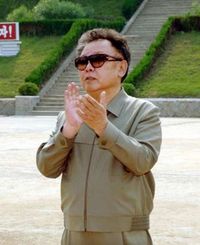 by Jason Strother
by Jason Strother
One of the foremost scholars on North Korea, Andrei Lankov, recently addressed Condoleeza Rice on How To Topple Kim Jong il in the March-April edition of Foreign Policy. While the article is available for subscribers only, here are the recommendations that the St. Petersburg native made to Madame Secretary:
Realize a Quiet Revolution Is Already Under Way: With the state-run economy in shambles, the government no longer has the resources to reward "correct" behavior or pay the hordes of lackeys who enforce the will of the Stalinist regime. Corruption runs rampant, and officials are always on the lookout for bribe. Old regulations still remain on the books, but they are seldom enforced. North Koreans nowadays can travel outside their county of residence without getting permission from the authorities. Private markets, once prohibited, are flourishing. People can easily skip an indoctrination session or two, and minor ideological deviations often go unpunished. It’s a far cry from a free society, but these changes do constitute considerable relaxation from the old days.
Deliver Information Inside: there are few broadcasts that North Koreans can hope to intercept. It was once assumed that South Korea would do the best job broadcasting news to its northern neighbor. And that was true until the late 1990s, when, as part of its "sunshine policy,"South Korea deliberately made these broadcasts "nonprovocative." There are only three other stations that target North Korea. But their airtime is short, largely due to a shortage of funds. Radio Free Asia and Voice of America each broadcast for roughly four hours per day, and Free North Korea (fnk), a small, South Korea-based station staffed by North Korean defectors, broadcasts for just one hour per day.
Leverage the Refugee Community in the South: There are some 10,000 North Korean defectors living in the South, and their numbers are growing fast. Unlike in earlier times, these defectors stay in touch with their families back home using smugglers’ networks and mobile phones. However, the defectors are not a prominent lobby in South Korea. In communist-dominated Eastern Europe, large and vibrant exile communities played a major role in promoting changes back home and, after the collapse of communism, helped ensure the transformation to democracy and a market economy. That is why the United States must help increase the influence of this community by making sure that a cadre of educated and gifted defectors emerges from their ranks.
Fund, Plan, and Carry out Cultural Exchanges: It makes sense for Korean students to study overseas (paid for with U.S. tax dollars), to bring their dancers or singers to perform in the West, and to invite their officials to take "study tours." Without question, North Korean officials are wary of these kinds of exchanges with the United States. However, they will be less unwilling to allow exchanges with countries seen as neutral, New Zealand. In the past, Pyongyang would never have allowed such exchanges to happen. But nowadays, because most of these programs will benefit elite, well-connected North Korean families, the temptation will be too great to resist. In other words, a senior official in Pyongyang might understand perfectly well that sending his son to study market economics at the Australian National University is bad for the communist system, but as long as his son will benefit, he will probably support the project.
(Imagine taking your North Korean dorm mate to his first frat party)
Convince Fellow Republicans That Subtle Measures Can Work: Some Republicans, particularly in the U.S. Congress, might object to any cultural exchanges that will benefit already-privileged North Koreans. And, for many, funding Voice of America isn’t as attractive as pounding a fist in Kim’s face. But these criticisms are probably short sighted. As a student of Soviet history, you know that mild exposure to the world outside the Soviet Union had a great impact on many Soviet party officials. And information almost always filters downstream. A similar effect can be expected in North Korea. During the Cold War, official exchange programs nurtured three trends that eventually brought down the Soviet system: disappointment among the masses, discontent among the intellectuals, and a longing for reforms among bureaucrats. Money invested in subtle measures is not another way to feed the North Korean elite indirectly; it is an investment in the gradual disintegration of a dangerous and brutal regime.
And now with the revelation that the intelligence on the DPRK’s uranium enrichment program may have been flawed, Dr. Lankov’s advice should be taken to heart.

Nice post. I agree that the United States needs to change her tact toward the DPRK. The situation over there is very complicated and not fluid. One mistake some senior American senators are making now is comparing the nuclear proliferation in the DPRK to that of Iran. I think the US will find a far more willing partner to negotiate in DPRK than Iran.
(Imagine taking your North Korean dorm mate to his first frat party)
They’d probably conclude that Juche was not so bad after all.